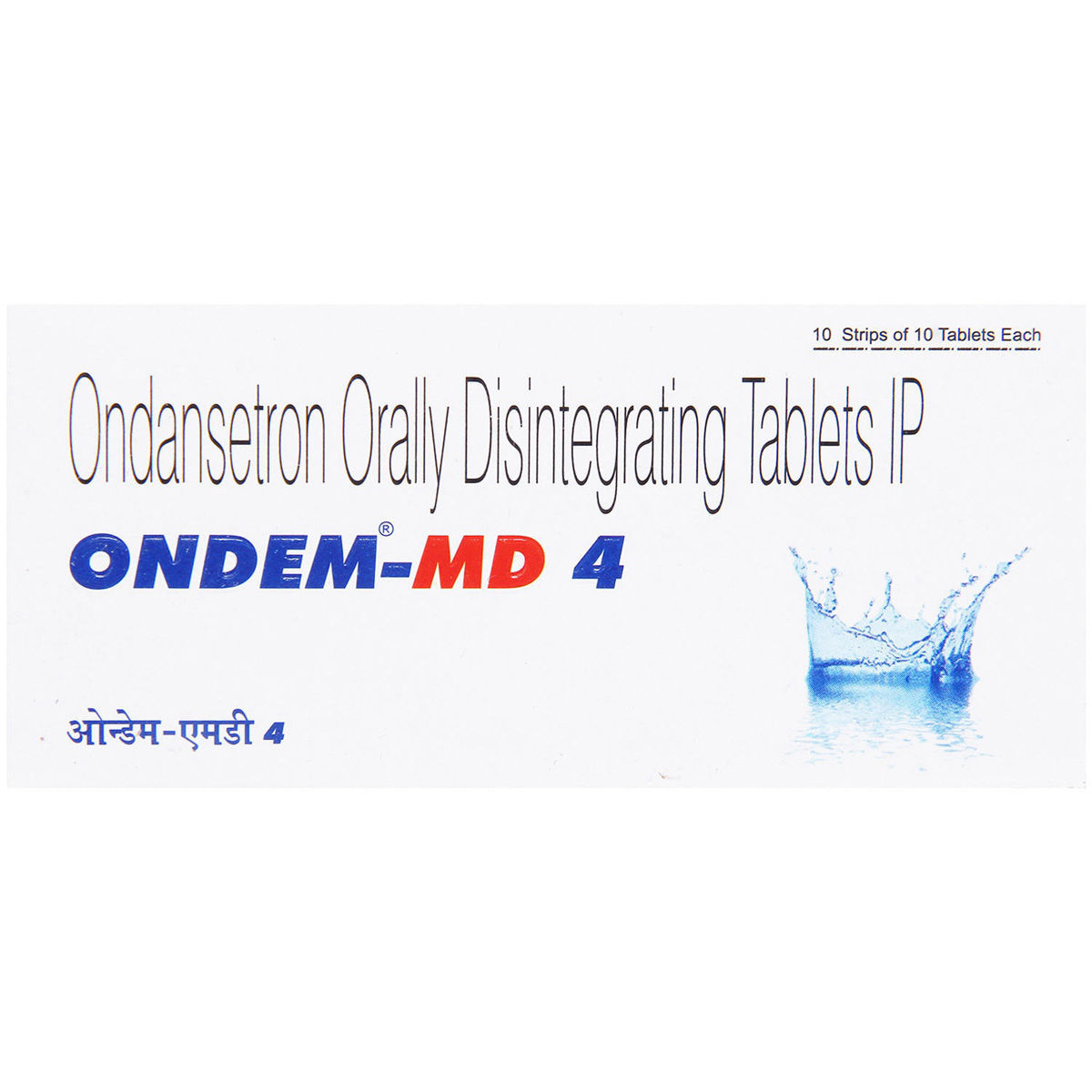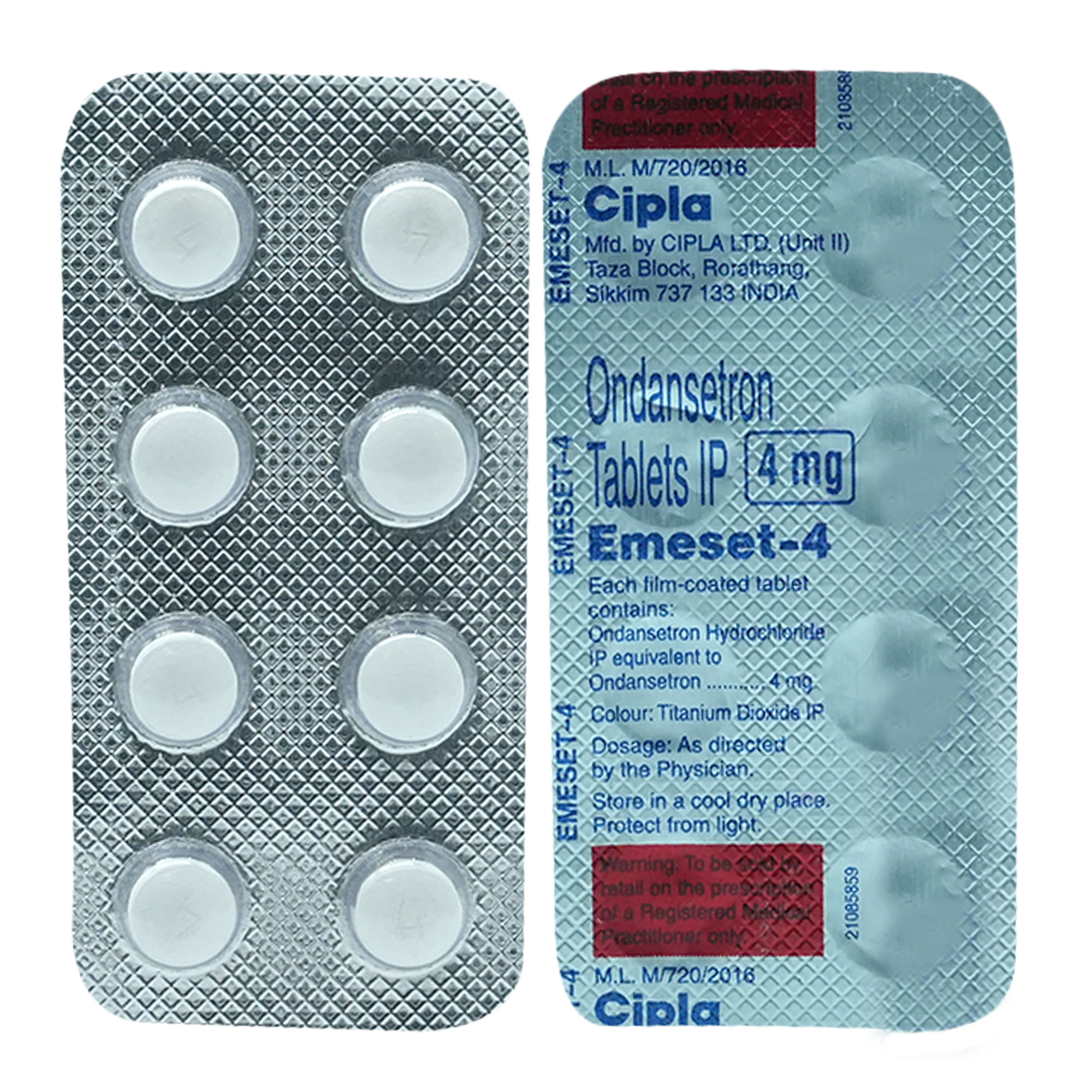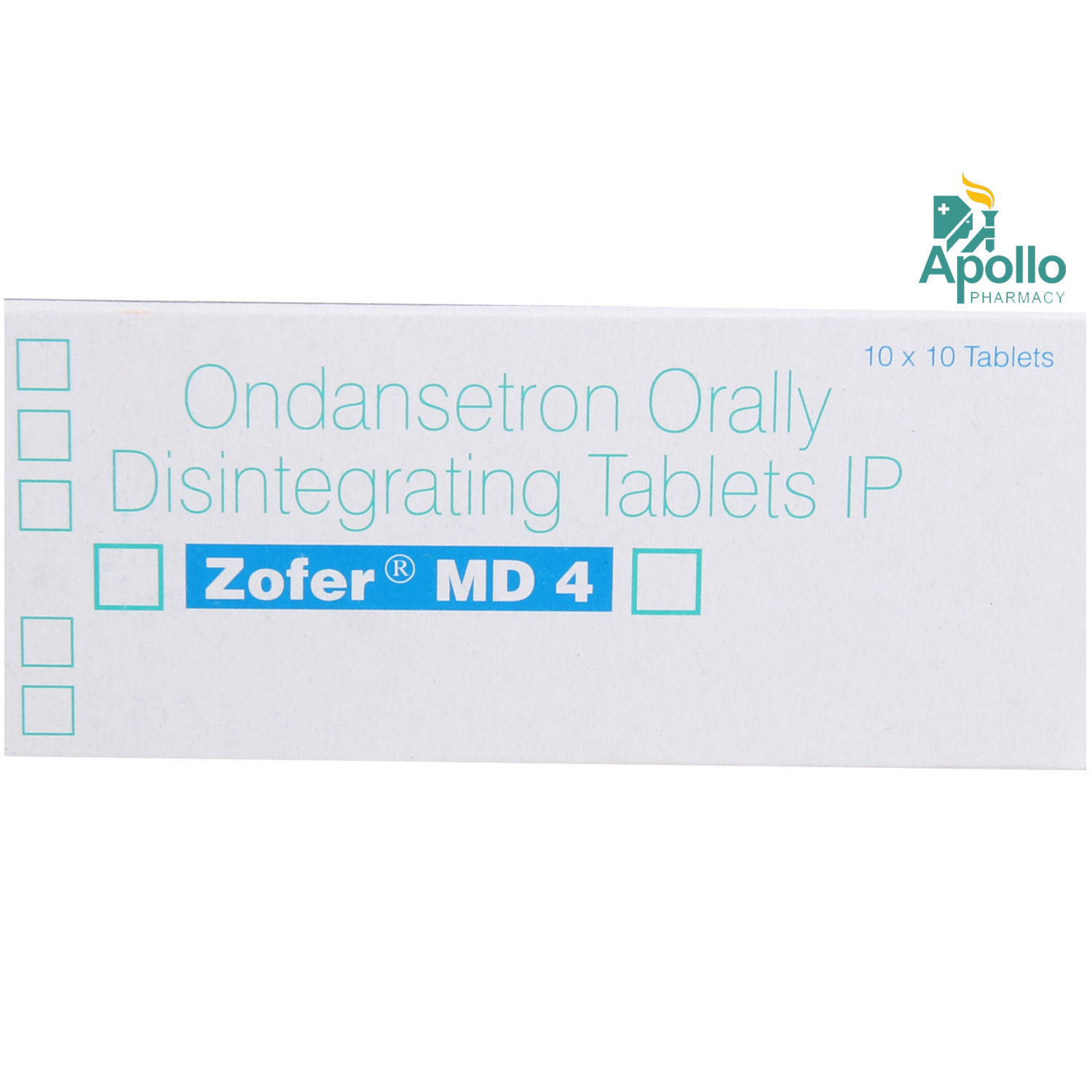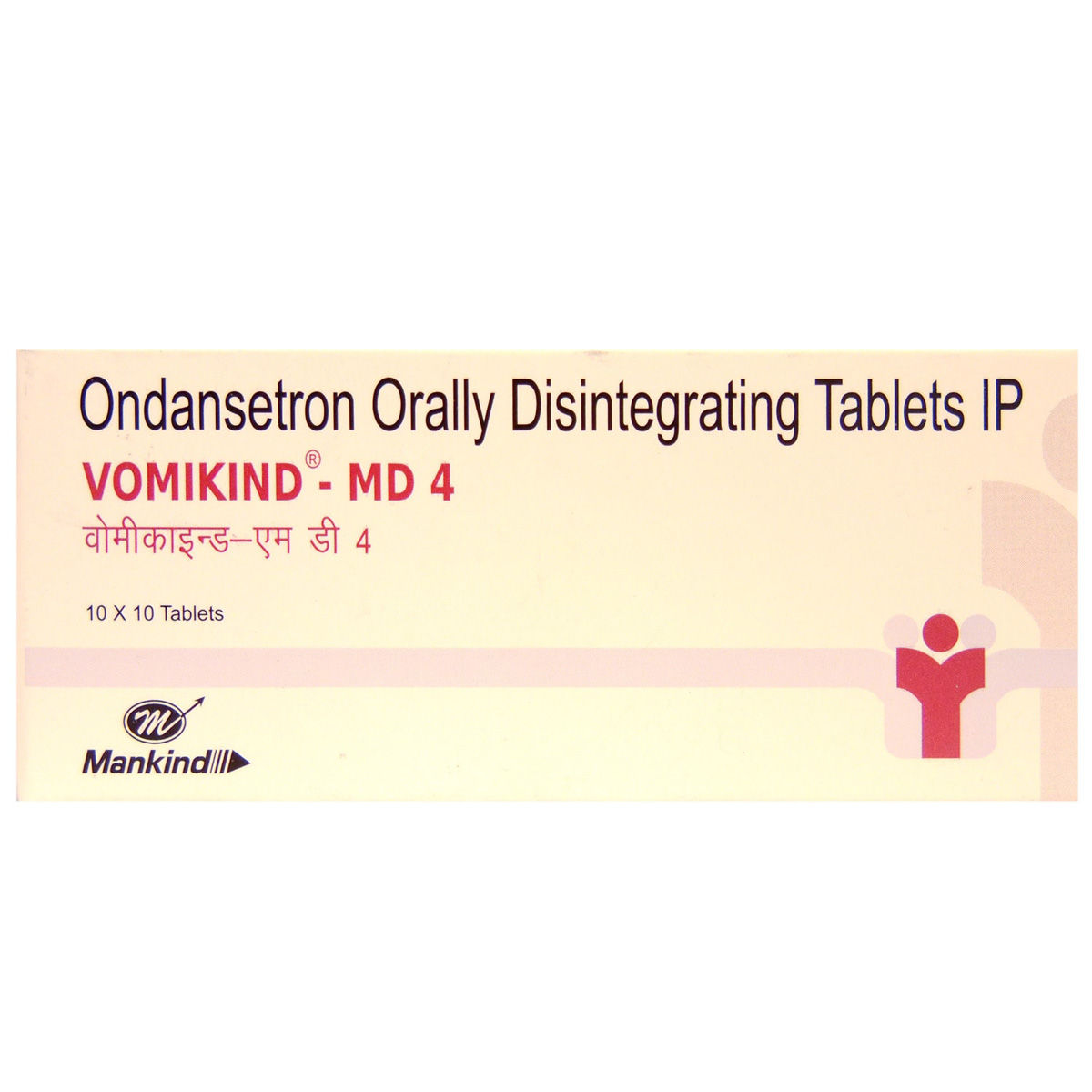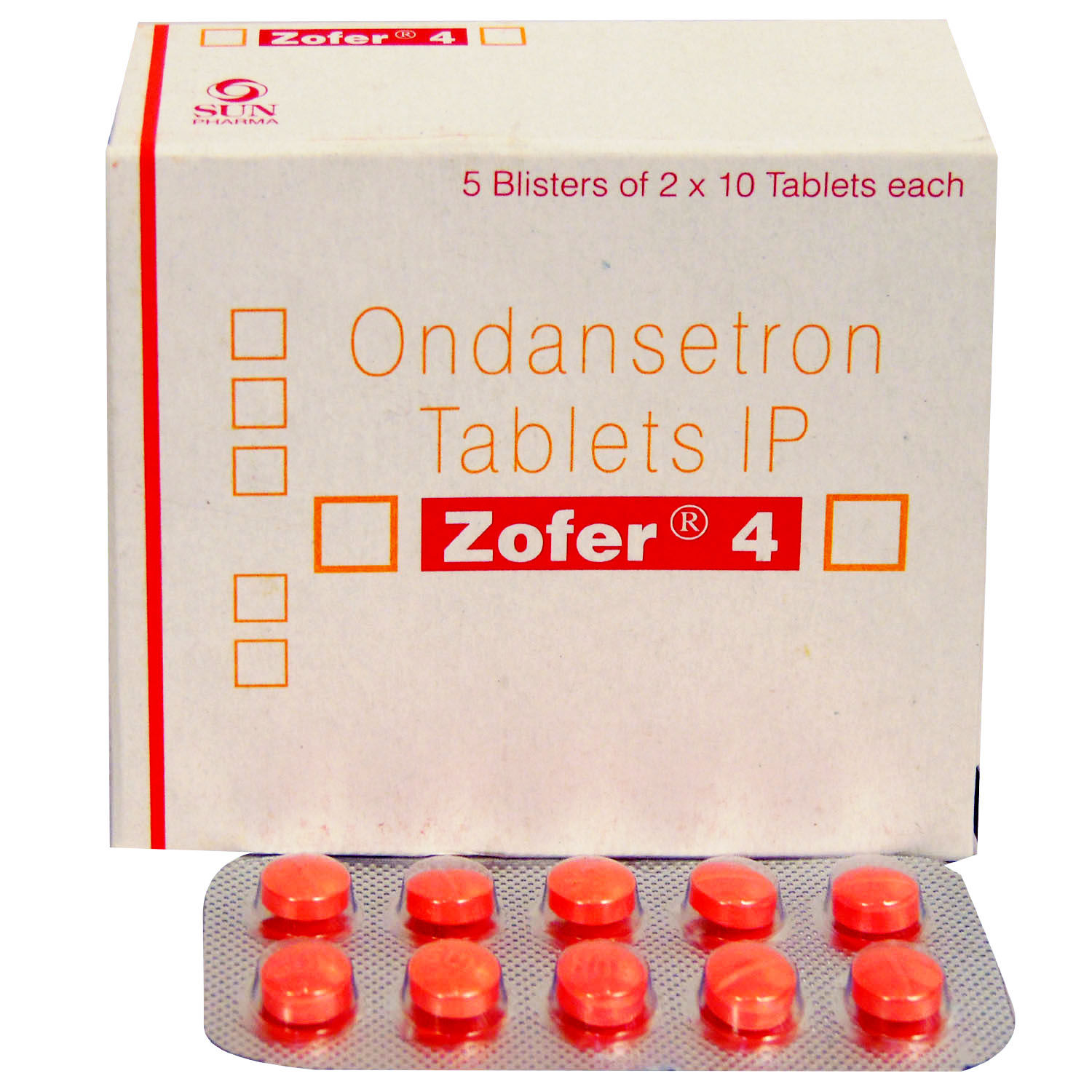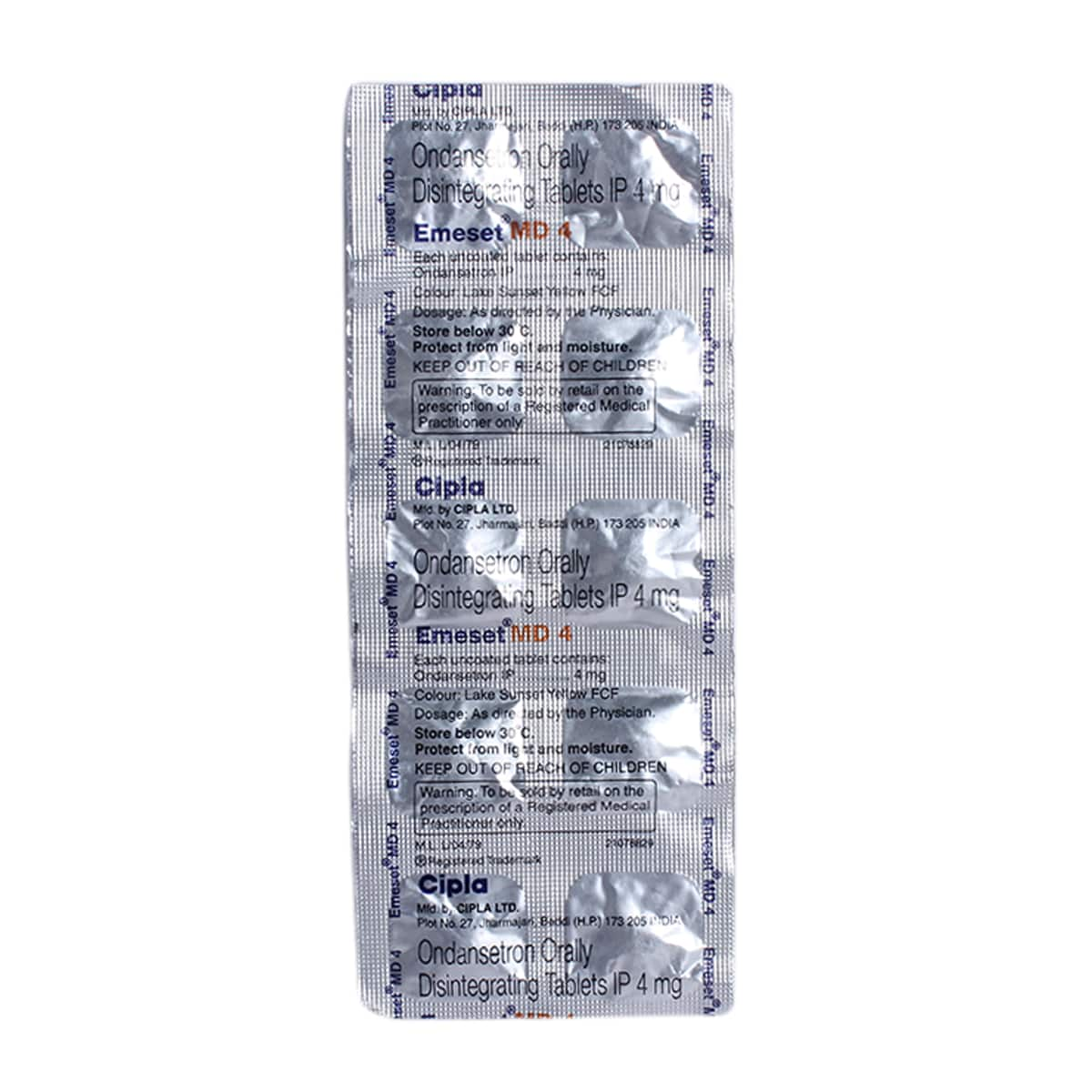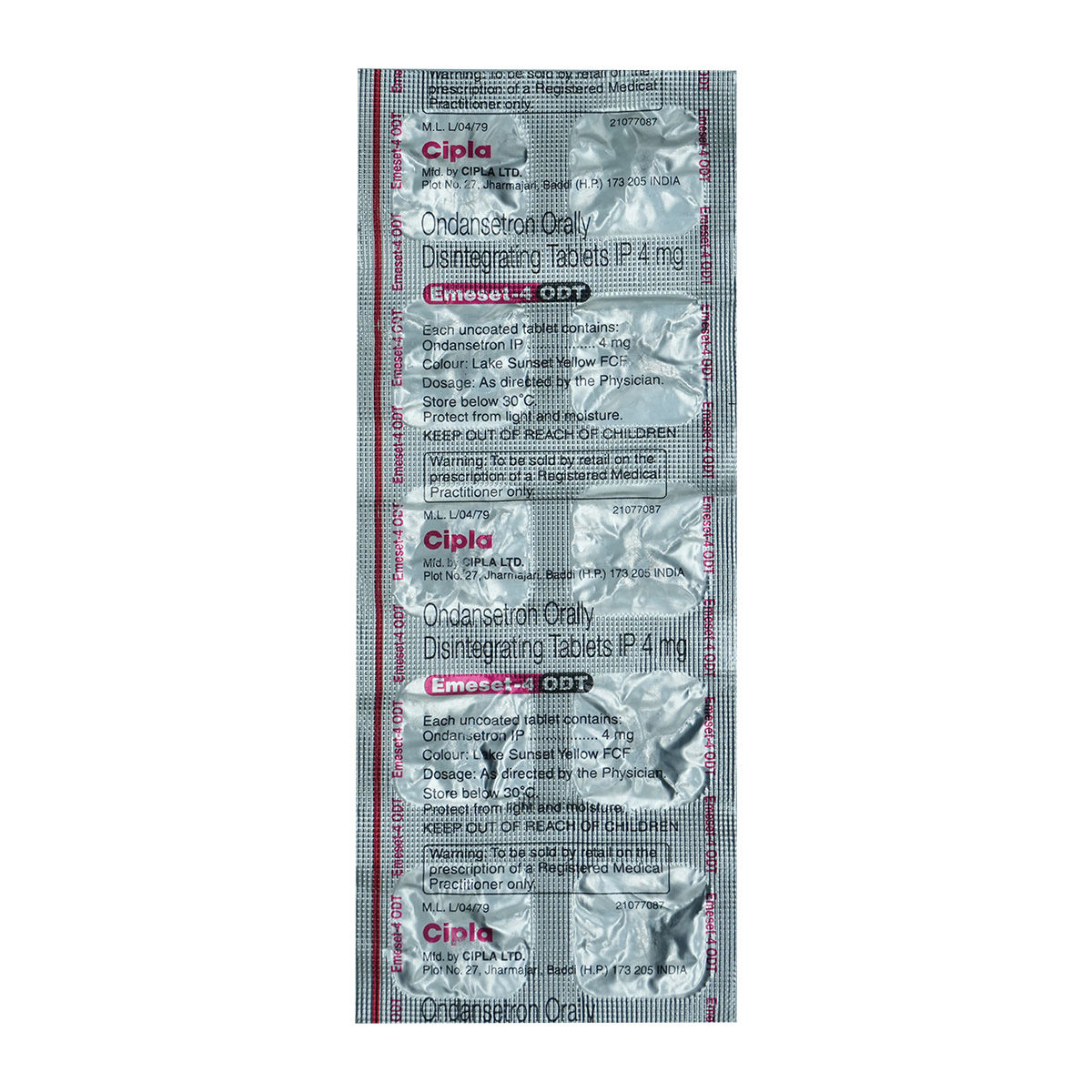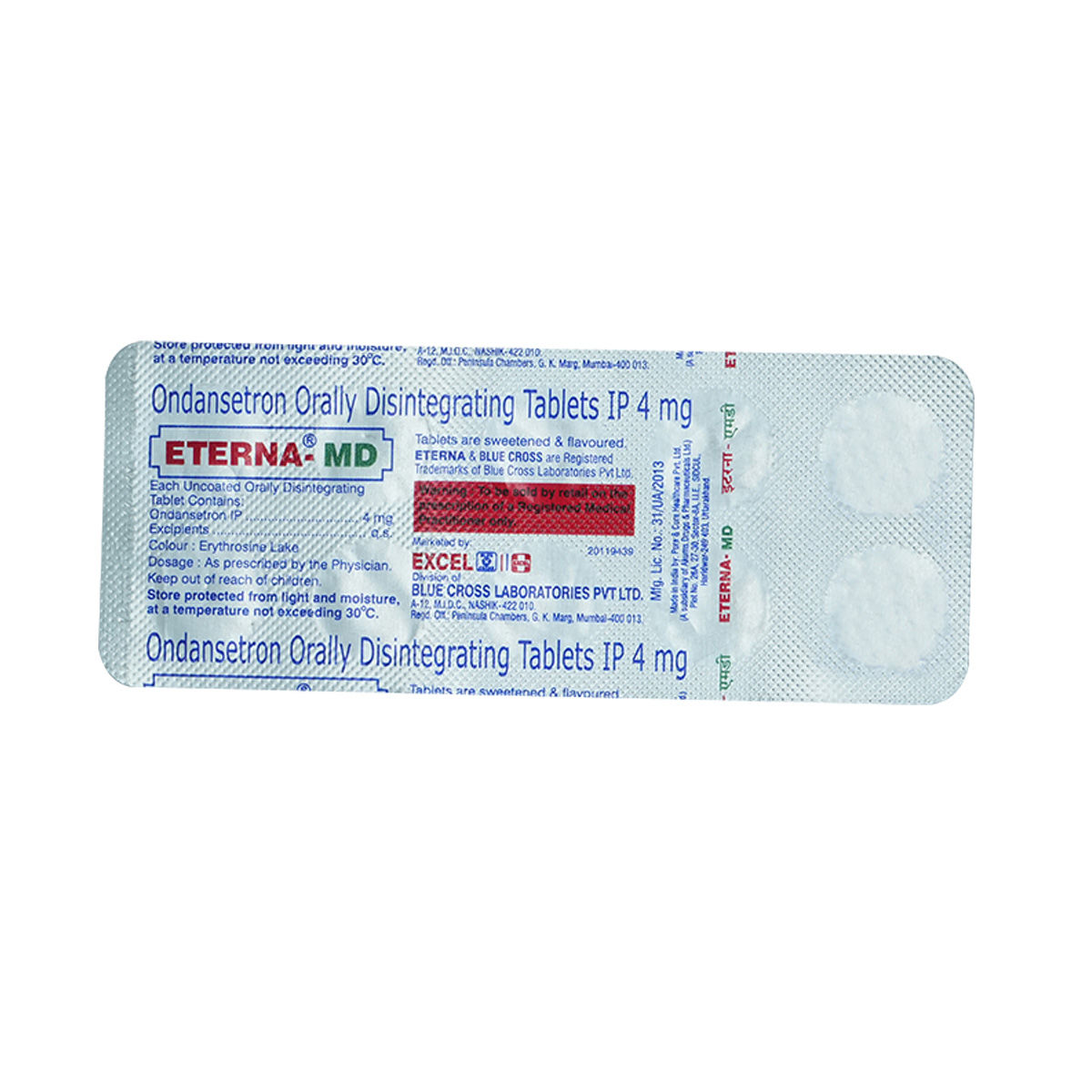Odr 4 Tablet 10's

₹202.5*
MRP ₹225
10% off
₹191.25*
MRP ₹225
15% CB
₹33.75 cashback(15%)
Free Delivery
With Circle membership
(Inclusive of all Taxes)
This offer price is valid on orders above ₹800. Apply coupon PHARMA10/PHARMA18 (excluding restricted items)
Odr 4 Tablet is used to prevent nausea and vomiting associated with moderately emetogenic cancer chemotherapy and radiotherapy in children. It also treats nausea and vomiting caused by stomach problems and surgery. It contains 'Ondanestron', which belongs to the serotonin 5-HT3 receptor antagonist. It works by blocking the action of a chemical called serotonin in the body, which is responsible for nausea and vomiting. As a result, Odr 4 Tablet prevents the sensation of nausea and vomiting caused due to cancer chemotherapy.
Know Your Delivery Time
Provide Delivery Location
Available Offers
 Prescription drug
Prescription drugWhats That

Secure Payment

India's Most Trusted Pharmacy

Genuine Products
Composition :
Manufacturer/Marketer :
Consume Type :
Return Policy :
Expires on or after :
About Odr 4 Tablet
Odr 4 Tablet is an antiemetic medicine. It is used to prevent nausea and vomiting associated with moderately emetogenic cancer chemotherapy and radiotherapy in children. It is also used to treat nausea and vomiting caused by stomach problems and surgery. Nausea is an uneasy feeling in which a person feels an urge to vomit, while vomiting is the natural response to the body's forceful discharge of the stomach contents.
Odr 4 Tablet contains 'Ondanestron' that belongs to serotonin 5-HT3 receptor antagonist. It works by blocking the action of a chemical called serotonin in the body, which is responsible for nausea and vomiting. As a result, Odr 4 Tablet prevents the sensation of nausea and vomiting caused by cancer chemotherapy.
Odr 4 Tablet may cause certain side effects in your child, such as feeling of warmth, headache, diarrhoea, and stomach pain. These side effects generally resolve over time. However, if it does not resolve, stop giving this medicine to your child and contact the paediatrician. Do not give more than the prescribed dose of Odr 4 Tablet to the child. Odr 4 Tablet can be given with or without food. Your paediatrician will decide the dose of the medicine.
Odr 4 Tablet is intended for paediatric use only. Avoid giving Odr 4 Tablet to your child if she/he is allergic to it. Keep your doctor informed about your child’s health condition, including his current medications and medical history, to rule out any side effects/interactions. Before administration, inform your child’s doctor if your child has liver and kidney problems.
Uses of Odr 4 Tablet
•Postoperative Nausea and Vomiting Relief: Odr 4 Tablet is commonly used to alleviate nausea and vomiting experienced by patients after surgical procedures, often caused by anesthesia.
•Supportive Care in Palliative Settings: Odr 4 Tablet provides relief for nausea and vomiting in palliative care patients, helping to improve comfort amidst challenges from underlying conditions or treatment side effects.
Directions for Use
Oral suspension: Shake the container well before each use. Measure the prescribed dose of Odr 4 Tablet and administer it to your child. It is advised to measure the quantity accurately with a measuring cup.
Medicinal Benefits
Odr 4 Tablet contains 'Ondanestron' that belongs to serotonin 5-HT3 receptor antagonist. It works by blocking the action of a chemical called serotonin in the body, which is responsible for nausea and vomiting. As a result, Odr 4 Tablet prevents the sensation of nausea and vomiting caused by cancer chemotherapy.
How Odr 4 Tablet Works
Storage
- Hydrate your body: Drink enough water to prevent dehydration and headaches.
- Calm Your Mind: Deep breathing and meditation can help you relax and relieve stress.
- Rest and Recharge: Sleep for 7-8 hours to reduce headache triggers.
- Take rest: lie down in a quiet, dark environment.
- Cold or warm compresses can help reduce tension.
- Stay Upright: Maintain good posture to keep symptoms from getting worse.
- To treat headaches naturally, try acupuncture or massage therapy.
- Over-the-counter pain relievers include acetaminophen and ibuprofen.
- Prescription Assistance: Speak with your doctor about more substantial drug alternatives.
- Severe Headaches: Seek emergency medical assistance for sudden, severe headaches.
- Frequent Headaches: If you get reoccurring headaches, consult your doctor.
- Headaches with Symptoms: Seek medical attention if your headaches include fever, disorientation, or weakness.
- Get enough sleep. Maintain a regular sleep cycle.
- Eat a healthy diet and exercise regularly.
- Manage stress with yoga or meditation.
- Limit alcohol and caffeine.
- Avoid driving or operating machinery unless you are alert.
- Inform Your Doctor: Notify your doctor immediately about your diarrhoea symptoms. This allows them to adjust your medication or provide guidance on managing side effects.
- Stay Hydrated: Drink plenty of fluids to replace lost water and electrolytes. Choose water, clear broth, and electrolyte-rich drinks. Avoid carbonated or caffeinated beverages to effectively rehydrate your body.
- Follow a Bland Diet: Eat easy-to-digest foods to help firm up your stool and settle your stomach. Try incorporating bananas, rice, applesauce, toast, plain crackers, and boiled vegetables into your diet.
- Avoid Trigger Foods: Steer clear of foods that can worsen diarrhoea, such as spicy, fatty, or greasy foods, high-fibre foods, and dairy products (especially if you're lactose intolerant).
- Practice Good Hygiene: Maintain good hygiene to prevent the spread of infection. To stay healthy, wash your hands frequently, clean and disinfect surfaces regularly, and avoid exchanging personal belongings with others.
- Take Anti-Diarrheal Medications: If your doctor advises, anti-diarrheal medications such as loperamide might help manage diarrhoea symptoms. Always follow your doctor's directions.
- Keep track of your diarrhoea symptoms. If they don't get better or worse or are accompanied by severe stomach pain, blood, or dehydration signs (like extreme thirst or dark urine), seek medical help.
- Inform your doctor about your constipation symptoms. They may adjust your medication or advise alternative treatments.
- Stay hydrated by drinking sufficient of water (at least 8-10 glasses a day) to help soften stool and promote bowel movements.
- Increase fibre intake by eating foods high in fibre, such as fruits, whole grains, vegetables and legumes, to help bulk up the stool.
- Establish a bowel routine by trying to go to the bathroom at the same time each day to train your bowels.
- Engaging in regular exercise, like walking or yoga, can support in bowel movement stimulation.
- Consult your doctor if constipation persists, and discuss alternative treatments or adjustments to your medication.
- Avoid rubbing or scratching the affected area, as this can cause further irritation and discomfort.
- Consider using a humidifier to add moisture to the air and help reduce the sensation.
- Seek medical attention if the sensation is severe, persistent, or worsens over time.
- Avoid extreme temperatures, such as hot or cold showers, that can exacerbate the sensation.
- Wear light, breathable clothing to help keep the body cool and reduce the sensation.
- Avoid triggers that can cause the sensation, such as spicy foods or hot drinks.
- Use cool compresses or fans to help lower body temperature and reduce the sensation.
- If you experience persistent or severe malaise (a general feeling of discomfort, illness, or unease) after taking medication, seek medical attention immediately.
- Inform your doctor about the medication you're taking and the symptoms you're experiencing.
- Your treatment plan may be modified, which may include adjusting the dosage, substituting with an alternative medication, or discontinuing the medication. Additionally, certain lifestyle changes may be recommended to help manage symptoms.
- To manage malaise symptoms, follow your doctor's advice, such as getting plenty of rest, staying hydrated, and practicing stress-reducing techniques.
- Track your symptoms regularly and report any changes or concerns to your healthcare provider to ensure the malaise is managed effectively.
- Rest well; get enough sleep.
- Eat a balanced diet and drink enough water.
- Manage stress with yoga and meditation.
- Limit alcohol and caffeine.
- Physical activities like walking or jogging might help boost energy and make you feel less tired.
What if I have taken an overdose of Odr 4 Tablet
Drug Warnings
Avoid giving Odr 4 Tablet to your child if he/she is allergic to it. Keep your doctor informed about your child’s health condition, including his current medications and medical history, to rule out any side effects/interactions. Before administration, inform your doctor if your child has liver and kidney disease. This medicine is intended for only the paediatric population. Hence, it is not recommended for use in special populations (pregnant and breastfeeding mothers) and adults.
Drug-Drug Interactions
Drug-Drug Interactions
Login/Sign Up
Taking Odr 4 Tablet with Ziprasidone can increase the risk of abnormal heart rhythm.
How to manage the interaction:
Taking Odr 4 Tablet with Ziprasidone is not recommended, but it can be taken together if prescribed by a doctor. However, consult a doctor if you experience sudden dizziness, lightheadedness, fainting, shortness of breath. Do not discontinue any medications without consulting a doctor.
Co-administration of tramadol with Odr 4 Tablet can increase the risk of serotonin syndrome (a condition in which a chemical called serotonin builds up in body).
How to manage the interaction:
Taking Odr 4 Tablet with tramadol together can result in an interaction, it can be taken if a doctor has advised it. However, if you experience any symptoms such as confusion, hallucination, seizure, increased heart rate, blurred vision, tremors, incoordination, stomach cramps, nausea, vomiting, and diarrhea, contact a doctor immediately. Do not discontinue any medications without consulting a doctor.
Taking Odr 4 Tablet and Sotalol can increase the risk or severity of irregular heart rhythms which can be severe.
How to manage the interaction:
Although taking Odr 4 Tablet and Sotalol can result in an interaction, it can be taken if a doctor has advised it. However, consult a doctor if you experience abrupt dizziness, lightheadedness, fainting, shortness of breath, or rapid heartbeat consult a doctor. Do not discontinue any medications without a doctor's advice.
Coadministration of Amitriptyline and Odr 4 Tablet can increase the risk of serotonin syndrome (a condition in which a chemical called serotonin builds up in body).
How to manage the interaction:
Although combining Amitriptyline with Odr 4 Tablet can lead to an interaction, they can be taken if prescribed by a doctor. If you have sudden dizziness, lightheadedness, fainting, confusion, hallucination, fits, blood pressure alteration, increased heart rate, fever, excessive sweating, shivering or shaking, blurred vision, pain in the muscles, or stiffness, incoordination, stomach cramps, nausea, vomiting, and diarrhea, or fast or rapid heartbeats during therapy, get emergency medical help. Inform a doctor if you have recently taken amitriptyline. Do not discontinue any medication without consulting a doctor.
Taking ceritinib together with Odr 4 Tablet can increase the risk of an irregular heart rhythm.
How to manage the interaction:
Co-administration of Odr 4 Tablet along with ceritinib can result in an interaction, but it can be taken together if prescribed by a doctor. However, consult a doctor if you experience sudden dizziness, lightheadedness, fainting, shortness of breath. Do not discontinue any medications without consulting a doctor.
Coadministration of Odr 4 Tablet with ivabradine can increase the risk of an abnormal heart rhythm.
How to manage the interaction:
Co-administration of Odr 4 Tablet along with ivabradine can result in an interaction, it should be taken only if a doctor has advised it. However, if you experience abrupt dizziness, lightheadedness, fainting, shortness of breath, or rapid heartbeat, consult a doctor. Do not discontinue any medications without a doctor's advice.
When Odr 4 Tablet is taken with linezolid it can cause serotonin syndrome. (a condition in which a chemical called serotonin builds up in body).
How to manage the interaction:
Co-administration of Odr 4 Tablet along with linezolid can lead to an interaction, it can be taken if recommended by a doctor. However, if you experience symptoms such as confusion, hallucination, seizure, extreme changes in blood pressure, increased heart rate, fever, excessive sweating, shivering or shaking, blurred vision, muscle spasm or stiffness, incoordination, stomach pain, nausea, vomiting, and diarrhea, consult the doctor. Do not discontinue any medications without consulting a doctor.
Coadministration of Odr 4 Tablet along with imipramine can increase the risk of serotonin syndrome (a condition in which a chemical called serotonin builds up in body).
How to manage the interaction:
Taking Odr 4 Tablet along with imipramine together can result in an interaction, it can be taken if a doctor has advised it. However, if you have sudden dizziness, lightheadedness, fainting, confusion, hallucination, fits, blood pressure alteration, increased heart rate, fever, excessive sweating, shivering or shaking, blurred vision, pain in the muscles, or stiffness, incoordination, stomach cramps, nausea, vomiting, and diarrhea, or fast or rapid heartbeats during therapy, consult the doctor. Do not discontinue any medications without consulting a doctor.
Taking Odr 4 Tablet with Moxifloxacin increases the risk of an abnormal heart rhythm.
How to manage the interaction:
Although taking Odr 4 Tablet along with Moxifloxacin can result in an interaction, it can be taken if a doctor has advised it. However, consult a doctor if you experience dizziness, shortness of breath, or rapid heartbeat. Do not discontinue any medications without a doctor's advice.
Taking Odr 4 Tablet with bedaquiline increases the risk of an abnormal heart rhythm.
How to manage the interaction:
Co-administration of Odr 4 Tablet along with bedaquiline can result in an interaction, it can be taken if a doctor has advised it. However, if you experience abrupt dizziness, lightheadedness, fainting, shortness of breath, or rapid heartbeat, get medical help immediately. Do not discontinue any medications without a doctor's advice.
Drug-Food Interactions
Drug-Food Interactions
Login/Sign Up
Diet & Lifestyle Advise
- Certain food items/medicines are known to cause nausea/vomiting to your child.
- Make your child drink more fluids to avoid dehydration.
- Providing your child with a healthy diet that includes lots of fruits and vegetables, nuts, and low-fat dairy products will help keep your child in good health and avoid chances of nausea and vomiting.
- Avoid giving greasy or oily foods to your child, as this food triggers nausea and vomiting.
Habit Forming
Therapeutic Class
Product Substitutes
Alcohol
Not applicable
-
Pregnancy
Not applicable
-
Breast Feeding
Not applicable
-
Driving
Not applicable
-
Liver
Caution
Please consult your doctor if your child has a liver impairment or if you have any concerns regarding this. Your paediatrician will weigh the benefits and risks before prescribing Odr 4 Tablet to your child.
Kidney
Caution
Please consult your doctor if your child has a kidney impairment or if you have any concerns regarding this. Your paediatrician will weigh the benefits and risks before prescribing Odr 4 Tablet to your child.
Children
Safe if prescribed
Odr 4 Tablet is safe for children above 4 years of age if prescribed by the doctor. The dose of the medicine will be decided by your paediatrician. Do not give more than the recommended dose to your child.

Have a query?
FAQs
Odr 4 Tablet is used to treat vomiting.
Odr 4 Tablet contains Ondanestron; that belongs to serotonin 5-HT3 receptor antagonist. It works by blocking the action of a chemical called serotonin in the body which is responsible for causing nausea and vomiting.
Use Odr 4 Tablet for as long as your paediatrician suggested.
Country of origin
Manufacturer/Marketer address
Disclaimer
Author Details
We provide you with authentic, trustworthy and relevant information











